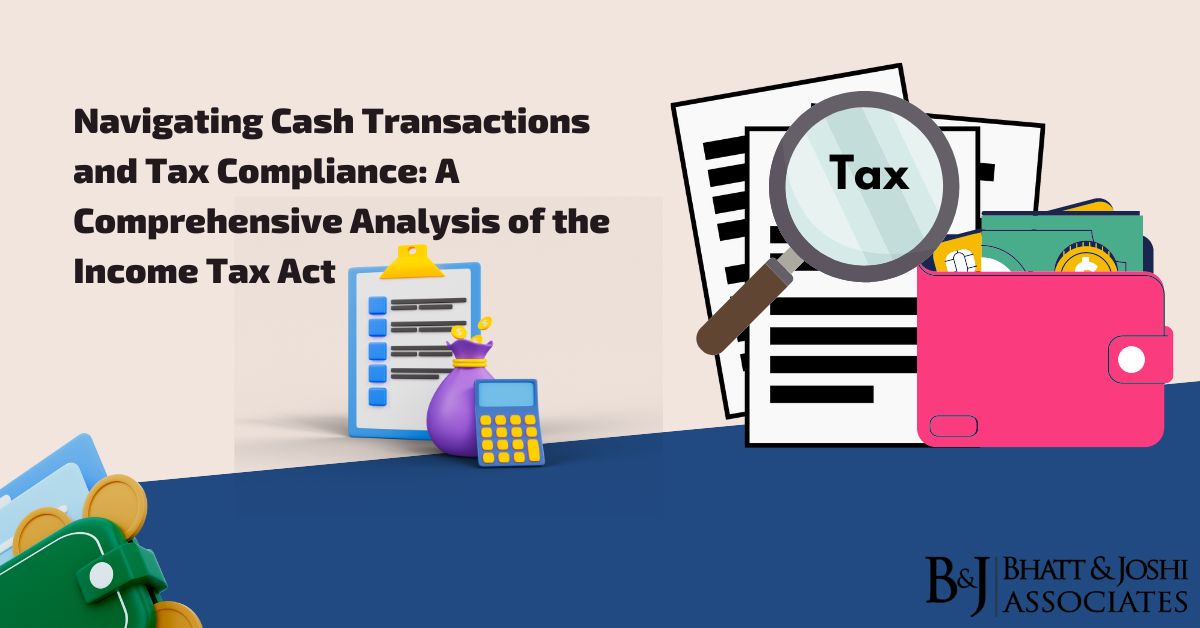Introduction
In an era where financial transparency and accountability are paramount, individuals and businesses must navigate the intricate landscape of cash transactions under the Income Tax Act. This article delves into key legal provisions and recent judicial precedents that shape the norms surrounding cash transactions in India, providing insights into tax compliance and offering practical strategies for individuals and businesses to ensure adherence to the law.
Understanding the Legal Framework of the Income Tax Act
The Income Tax Act encompasses crucial sections that play a pivotal role in regulating cash transactions and promoting financial transparency. These sections, including Section 269ST, Sections 269SS and 269T, and Section 68, form the backbone of the legal framework governing cash dealings in the country.
Section 269ST: Combatting Black Money
Section 269ST is a cornerstone in the fight against black money, placing restrictions on accepting cash transactions of Rs. 2 lakh or more from a single person in a day, per transaction, or related to a single event. The article emphasizes the hefty penalty associated with non-compliance, which equals the amount received.
Sections 269SS and 269T: Loans, Deposits, and Specified Sums
Sections 269SS and 269T outline the modalities for accepting or repaying loans, deposits, or specified sums. These sections impose restrictions on cash transactions exceeding Rs. 20,000, advocating for banking channels as the preferred medium. The penalties under Sections 271D and 271E, respectively, underscore the importance of adhering to these regulations, equaling the transaction amount.
Section 68: Demanding Transparency
Section 68 mandates transparency by requiring taxpayers to furnish credible explanations for the source and nature of cash credits in their books. The article emphasizes the significance of satisfying the assessing officer’s scrutiny to avoid the amounts being taxed as unexplained income.
Judicial Interpretations: Guiding Principles
Recent judicial interpretations, such as those in the cases of Rajshree Realtors (P.) Ltd. v. Union of India [2023], Principal Commissioner of Income-tax, Mysore v. Khyathi Steel Industries (P.) Ltd. [2023], and Principal Commissioner of Income-tax (Central) v. Swetaben Ghanshyambhai Patel [2023], provide essential guiding principles for understanding the legal obligations and implications of non-compliance. These cases underscore the necessity of full disclosure, evidence-based assessments, and the importance of concrete evidence to support tax additions.
Practical Compliance with the Income Tax Act: Navigating Cash Transactions
To ensure practical compliance with these legal mandates, individuals and businesses should follow a set of actionable steps:
- Limit Cash Transactions: Adhering to prescribed thresholds outlined in Sections 269SS, 269ST, and 269T is crucial to avoid penalties.
- Maintain Documentation: Thorough records of transactions, especially for loans, deposits, and cash credits, should be kept to substantiate the source and purpose, as required under Section 68.
- Understand Exceptions: Familiarizing oneself with exceptions under each relevant section is essential, as certain transactions with government entities, banks, and specified institutions may be exempted.
- Seek Professional Advice: Given the complexities of tax laws and the severe consequences of non-compliance, consulting with tax professionals or legal experts can provide tailored advice and preventive strategies.
Conclusion: Navigating Tax Compliance under the Income Tax Act
The stringent provisions of the Income Tax Act regarding cash transactions are designed to curb the circulation of black money and foster a transparent financial ecosystem. This comprehensive analysis explores key sections and recent judicial precedents, providing valuable insights into tax compliance. By understanding and adhering to these regulations, taxpayers can successfully navigate the intricacies of tax laws, ensuring compliance and peace of mind in their financial dealings.













